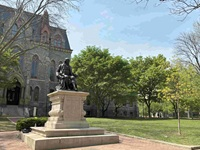Speaker
Description
We propose and simulate a novel experiment to quantify the energy stored in stable crystal defects—such as Frenkel pairs—produced by nuclear recoils following neutron capture. These quantum defects can absorb part of the recoil energy, altering the apparent energy scale for nuclear recoils and impacting the interpretation of signals in low-threshold dark matter and coherent elastic neutrino-nucleus scattering (CEνNS) experiments. By simultaneously detecting the de-excitation gamma and the associated recoil nucleus from neutron capture, we aim to directly measure this missing energy. Simulations using a 1 mCi californium neutron source show that such a measurement is feasible with only 26.1 gram-days of exposure using existing detector technologies. This method not only improves low-energy calibration and opens the door to future single-defect energy measurements, but also enables investigation of defect annealing effects as a potential contributor to the low-energy excess observed in recent dark matter experiments.

